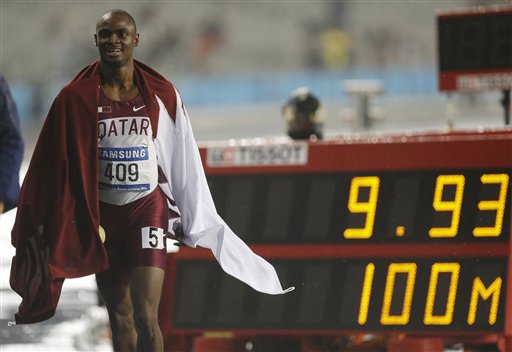Asian Games: African-born athletes ‘unfair’

Qatar’s Femi Ogunode stands by his race time after setting a games record in winning the men’s 100 meters final at the 17th Asian Games in Incheon, South Korea, Sunday, Sept. 28, 2014. AP
INCHEON — Asian competitors are becoming increasingly desperate over African-born athletes running for wealthy Gulf states who have dominated the Asian Games track golds for the third contest in a row.
“I think it’s unfair because they are taller and have a longer stride,” men’s 100 meter silver medallist Su Bingtian told AFP. “They are more powerful and athletic. Physically we are at a disadvantage.”
Article continues after this advertisementSu lost to Qatar’s Femi Ogunode, born in Nigeria, who smashed Asia’s men’s 100 meters record on Sunday with a 9.93sec time.
Japanese and South Korean sprinters added their voice to the protests, while Asian sport leaders appear divided over the foreign influx.
Competitors originally from Africa have swept to five gold medals in seven races in the first two days of the Asian Games athletics, blowing away their native Asian competitors.
Article continues after this advertisementForeign imports, mainly representing Bahrain and Qatar, have continued a dominance in track events which stretches back to the 2006 Doha Games, when Kenya-born runners won the men’s 800m, 1500m, 5,000m, 10,000m, 3000m steeplechase and marathon.
At the 2010 Guangzhou Games, Bahrain and Qatar’s African runners again completely dominated the men’s long-distance track events, taking all six medals in the 5,000m and 10,000m
In Incheon, Bahrain’s Nigerian import Oluwakemi Adekoya won the women’s 400m just months after switching country, to add to Kenyan-born teenager Ruth Jebet’s gold for the kingdom in the 3,000m steeplechase.
Meanwhile, Alia Saeed Mohammed — originally from Ethiopia — stood draped in the flag of her adopted United Arab Emirates after winning the 10,000m.
It has been the same story in the men’s competition.
The men’s 5,000m saw Moroccan-born Mohamad Al-Garni taking gold ahead of Bahrain’s Alemu Bekele Gebre, who switched allegiance from Ethiopia, and Albert Kibichii Rop, formerly Kenyan.
Ogunode, who scored a golden 200-400 double in Guangzhou, left Su (10.10sec) and Japan’s Kei Takase (10.15sec) trailing in his wake in the 100m.
No native Asian has ever run below 10 seconds.
The Japanese sprinter conceded that Asians could be “left behind” as the bar set by African runners at Asia’s Olympics gets “higher and higher”.
South Korean Kim Kuk-Young suggested that the foreign influx would lead Asian runners to lose hope.
“My time isn’t really competitive against the African athletes,” he sighed.
‘Greater capacity to run’
The ranks of the world’s top long and middle distance runners have long been stuffed with Kenyans, Ethiopians and Moroccans, and competition to get into their national teams is fierce.
This has led to many budding young athletes turning to the opportunities, income and facilities offered by the likes of Qatar and Bahrain.
South Korea’s Kim Yong-Gu, who narrowly missed out on qualifying for the men’s 1,500m final, said the difference between himself and runners from Africa was plain to see.
“I felt during my race that there was a gap between them and the Asian competitors. They seem to have a greater capacity to run,” he told AFP.
Kim added that he hoped the Asian Games would get back to “what it was like 10 years ago,” before the switching of allegiance became commonplace.
Olympic Council of Asia official honorary vice president Wei Jizhongo echoed the sentiment, saying countries should “work together to decrease” the number of imported medal winners.
“If they buy some athletes they stop the training of their athletes. This is not beneficial for their country’s sports,” Wei told reporters.
But some Asian runners said the imports could help drive up standards.
“We believe the inclusion of more and more African athletes is better for us,” said Ding Changqin, silver medallist to UAE’s Mohammed in the 10,000m.
“It makes us more powerful and we believe it will make us try harder and achieve better results.”
“We are not worried about that,” said Husain al Musallam, director general of the Olympic Council of Asia, who is from Kuwait. “Maybe the new Asian athletes will work harder to achieve a higher standard.”
The African-born athletes were unequivocal — switching allegiance gives them the best opportunity to compete at the highest level.
“It’s hard to make the team in Kenya. Everyone is very strong,” said middle-distance runner Rop. “I sought a way (to get on).”
RELATED STORIES
At Asian Games, rivalries not always about sports